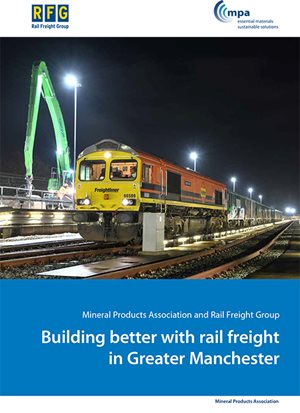 A new report setting out the economic and environmental case for more rail freight into Greater Manchester has been published by the Mineral Products Association (MPA) and the Rail Freight Group (RFG).
A new report setting out the economic and environmental case for more rail freight into Greater Manchester has been published by the Mineral Products Association (MPA) and the Rail Freight Group (RFG).
Published this week, ‘Building Better with Rail Freight in Greater Manchester’ highlights the benefits of rail freight over road haulage for transporting essential construction materials like aggregates and cement. Rail freight typically produces 76% less carbon dioxide than the equivalent road journeys and a single aggregates train can carry the same load as up to 125 lorries.
MPA members supply around 200 million tonnes of aggregates and nine million tonnes of cement each year to meet UK demand. Working with the freight operating companies that form the RFG’s membership, around 10% of these materials are transported by rail, with the vast majority going by road.
Whilst that places mineral products as the second largest market segment on the rail network after containerised intermodal freight, MPA and RFG believe there’s a huge opportunity to grow the use of rail for construction materials, reducing lorry miles, alleviating traffic congestion and reducing carbon emissions.
The new report sets out the steps the mineral products and rail freight industries are taking to deliver that growth, and explains how local and national government, as well as Network Rail, can help support the industries’ ambitions.
Among the issues highlighted in the report are protecting parcels of land for use as urban rail terminals in the planning system, ensuring affordable and competitive track access charges, prioritising the timetabled slots for freight, and supporting electrification and other steps that support decarbonisation.
Showcasing key investments made by MPA members in Greater Manchester, the report underscores the role played by rail freight bringing in essential materials into the city to support infrastructure improvements, community regeneration and the building of new homes. All build development and economic growth require aggregates and cement, along with downstream products like concrete and asphalt.
Maggie Simpson, Director General of the Rail Freight Group, said: “Greater Manchester has one of the fastest growing economies in the UK, and is seeing investment in new homes, offices and infrastructure. Rail freight is already helping to minimise the carbon emissions of this construction, and with the right policy environment in place our members will be able to transport more products by rail into the region, reducing the number of lorries on our roads.”
Robert McIlveen, Director of Public Affairs at MPA said: “Rail freight is an environmentally efficient way for MPA members to deliver aggregates and cement to city centre locations where they are in the greatest demand. We would love to see the market for materials by rail grow to allow the industry to supply more materials in a more efficient and environmentally friendly manner and we hope that government policy will help to deliver more desired outcomes for all.”
ENDS
Notes for editors
All the images are available in high resolution on request.
About the Mineral Products Association:
The Mineral Products Association (MPA) is the trade association for the aggregates, asphalt, cement, concrete, dimension stone, lime, mortar and industrial sand industries. With the merger of British Precast, and affiliation of the British Association of Reinforcement (BAR), the British Calcium Carbonate Federation, the Cement Admixtures Association (CAA), CONSTRUCT, Eurobitume, MPA Northern Ireland, MPA Scotland and the UK Quality Ash Association (UKQAA), it has a growing membership of 520 companies and is the sectoral voice for mineral products. MPA membership is made up of the vast majority of independent SME quarrying companies throughout the UK, as well as the 9 major international and global companies. It covers 100% of UK cement and lime production, 90% of GB aggregates production, 95% of asphalt and over 70% of ready-mixed concrete and precast concrete production. In 2021, the industry supplied £22 billion worth of materials and services to the Economy. It is also the largest supplier to the construction industry, which had annual output valued at £178 billion. Industry production represents the largest materials flow in the UK economy and is also one of the largest manufacturing sectors.
For media enquiries, contact Elizabeth Clements at: Elizabeth.Clements@mineralproducts.org
About the Rail Freight Group:
Rail Freight Group (RFG) is the representative body for rail freight in the UK. Its members include rail freight operators, logistics companies, ports, equipment suppliers, property developers and support services, as well as retailers, construction companies and other customers. Its aim is to increase the volume of goods moved by rail.
https://rfg.org.uk
For media enquiries, contact James Falkner at: james@rfg.org.uk; tel: 07753 271110